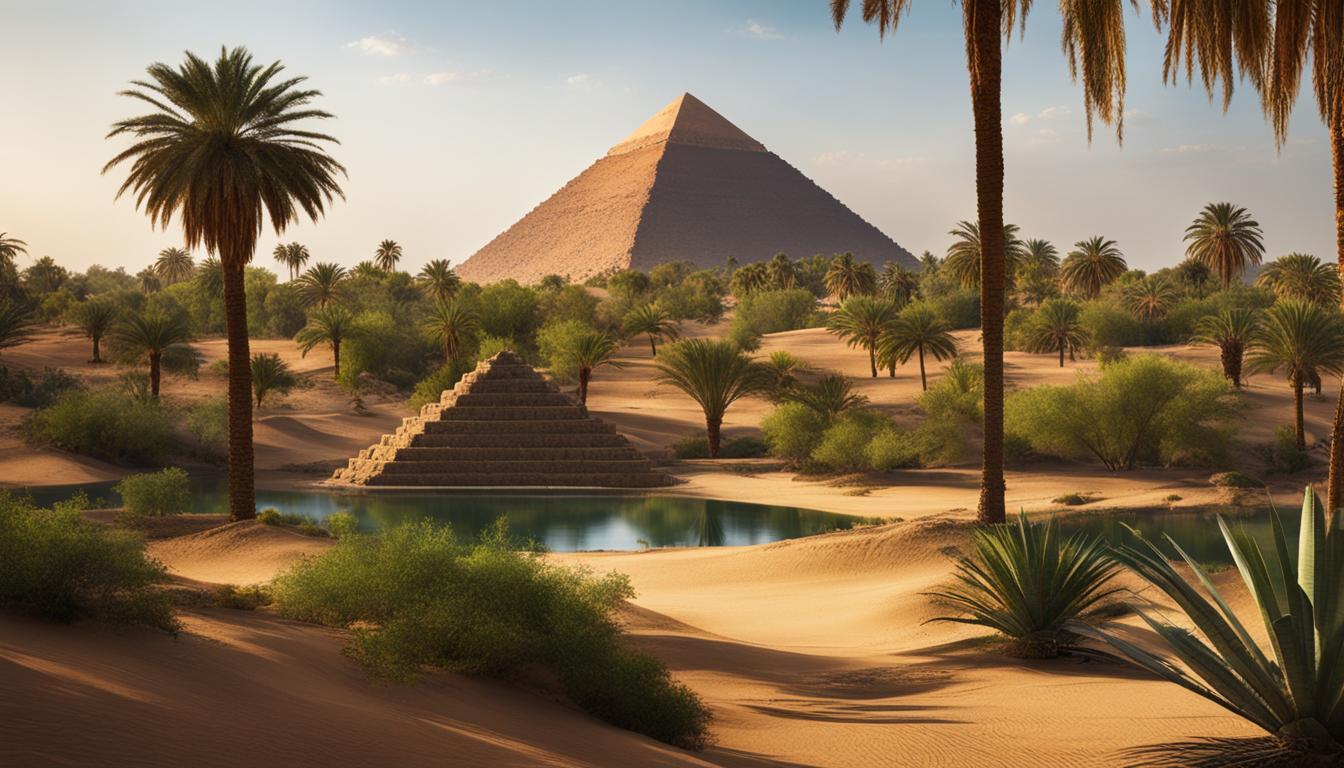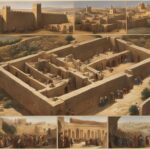Israel, also known as the Holy Land, holds immense biblical importance and is a destination that allows visitors to delve into its rich history, culture, and natural beauty. This sacred land is deeply rooted in the stories and teachings of the Bible, making it a significant place for spiritual enrichment and exploration.
Throughout history, many notable biblical figures have been linked to Israel. From Abraham, the founding patriarch of Judaism, to Moses, David, Solomon, and Jesus, these influential individuals have left indelible marks on the land and its people. Exploring Israel provides a unique opportunity to walk in the footsteps of these historical figures and gain insights into their lives and stories.
In biblical times, Israel was a land of great significance. Divided into various kingdoms, it was characterized by its agricultural practices and prominent cities like Jerusalem and Jericho. Witnessing the remnants of this ancient civilization allows visitors to connect with the roots of the Holy Land and better understand its historical context.
Israel is also the setting for numerous major biblical events. From the Exodus of the Israelites from Egypt to the giving of the Ten Commandments at Mount Sinai and the journey of Jesus Christ, these transformative experiences have shaped the history and identity of the land. By exploring the sites associated with these events, visitors can deepen their understanding of the narratives found in the Bible.
Today, modern Israel beautifully blends its ancient heritage with a vibrant and diverse culture. Cities like Tel Aviv and Jerusalem showcase a unique fusion of historical and modern elements, while the Dead Sea offers a place of relaxation and rejuvenation. Countless archaeological sites, museums, and art galleries provide glimpses into the past, and the country’s captivating landscapes provide endless opportunities for outdoor adventures.
By planning a journey to Israel, travelers can immerse themselves in its heritage, witness its captivating landscapes, and create lasting memories. This Holy Land is a treasure trove of history, culture, and natural beauty, waiting to be discovered.
Key Takeaways:
- Israel holds immense biblical importance as the Holy Land, linked to numerous notable biblical figures and events.
- In biblical times, Israel was characterized by its agricultural practices and prominent cities.
- Major biblical events, such as the Exodus and the journey of Jesus, took place in Israel, leaving lasting impacts on its history.
- Modern Israel offers a vibrant blend of ancient heritage and contemporary culture, with cities like Tel Aviv and Jerusalem at its forefront.
- Exploring Israel allows visitors to witness its captivating landscapes and create lasting memories.
Biblical Importance of Israel
Israel holds immense biblical importance as it is mentioned extensively in the Bible. It is referred to as the Holy Land and is associated with numerous biblical figures and events. It is the birthplace of Judaism, Christianity, and Islam. Exploring Israel allows visitors to experience the places and stories they have read about in the Bible, deepening their understanding of its biblical significance.
Notable Biblical Figures in Israel
Israel is closely connected to many notable biblical figures. For example, it is the birthplace of Abraham, the founding patriarch of Judaism. Other significant figures associated with Israel include Moses, David, Solomon, Elijah, John the Baptist, and Jesus. Exploring Israel can provide insights into the lives and stories of these important biblical figures.
Major Biblical Events in Israel
Israel is the setting for numerous major biblical events. These include the Exodus of the Israelites from Egypt, the crossing of the Red Sea, the giving of the Ten Commandments at Mount Sinai, and the journey of Jesus Christ. The land of Israel has undergone transformative experiences, leaving indelible marks in its history. Exploring these sites can deepen one’s understanding of biblical narratives.
| Biblical Event | Impact on Israel’s History |
|---|---|
| Exodus from Egypt | Establishment of Israelite nation; escape from slavery |
| Giving of the Ten Commandments | Formation of moral and ethical foundations for Israelites |
| Crossing of the Red Sea | Symbolic liberation and deliverance from oppression |
| Journey of Jesus Christ | Crucifixion, resurrection, and the birth of Christianity |
Israel’s biblical importance, notable figures, and major events make it a significant destination for spiritual enrichment and historical exploration. By delving into its ancient roots, visitors can witness firsthand the places and stories that have shaped the world’s religious and cultural history.
Notable Biblical Figures in Israel
Israel is closely connected to many notable biblical figures. These individuals played significant roles in shaping the history and religious significance of the Holy Land. Exploring Israel allows visitors to gain insights into the lives and stories of these important biblical figures.
Abraham
Abraham, also known as Abram, is considered the founding patriarch of Judaism. He is believed to have been born in Ur, in present-day Iraq, but it was in Israel that his journey and connection with God developed. According to biblical accounts, Abraham received divine promises from God and is revered as a man of great faith and obedience.
Moses
Moses is one of the most influential figures in Jewish history, known for leading the Israelites out of slavery in Egypt and receiving the Ten Commandments from God. He played a crucial role in the Exodus and the subsequent journey to the Promised Land.
David
David, the second king of Israel, is celebrated for his military achievements and his role in establishing Jerusalem as the capital city. He is also known for composing the biblical Psalms, which are considered foundational to Jewish and Christian worship.
Elijah
Elijah was a prophet and a key figure in the Israelite religion. He is known for his confrontations with the prophets of the Canaanite god Baal and for his ascension to heaven in a chariot of fire. Elijah’s teachings and miracles have made him a revered figure in Jewish tradition.
John the Baptist
John the Baptist, a cousin of Jesus, is recognized for his role as a prophet who prepared the way for the coming of the Messiah. He baptized Jesus in the Jordan River and played a crucial role in the early ministry of Jesus.
Jesus
Jesus, the central figure of Christianity, was born in Bethlehem and spent much of his life in the region now known as Israel. His teachings, miracles, crucifixion, and resurrection form the foundation of the Christian faith. Numerous sites associated with Jesus, such as the Church of the Holy Sepulchre and the Sea of Galilee, attract millions of pilgrims and tourists each year.
Exploring Israel provides a unique opportunity to delve into the lives and stories of these notable biblical figures. The historical and cultural significance of the Holy Land is intertwined with their legacies, making it a destination of deep spiritual and historical significance.
| Biblical Figure | Significance |
|---|---|
| Abraham | Founding patriarch of Judaism |
| Moses | Leader of the Exodus and receiver of the Ten Commandments |
| David | Second king of Israel, established Jerusalem as the capital |
| Elijah | Prophet, known for his confrontations and ascension to heaven |
| John the Baptist | Prophet who prepared the way for Jesus |
| Jesus | Central figure of Christianity, performed miracles and teachings |
Israel in Biblical Times
In biblical times, Israel was a land of great significance. It was divided into various kingdoms, such as the Kingdom of Israel and the Kingdom of Judah. The land was characterized by its agricultural practices, with people relying heavily on farming and herding. Cities like Jerusalem and Jericho played prominent roles in biblical narratives. Exploring Israel allows visitors to witness the remnants of this ancient civilization.
The ancient Israelites, led by figures like Moses and Joshua, traversed this land on their journey to the Promised Land. The land of Canaan, as it was known then, became the inheritance of the twelve tribes of Israel. Each tribe was allocated a specific portion of land, which formed the basis of their livelihoods. Agriculture was the backbone of the economy, with olive trees, vineyards, and wheat fields dotting the landscape.
“And the Lord brought us out of Egypt with a mighty hand and an outstretched arm, with great signs and wonders.” – Deuteronomy 26:8
This period in Israel’s history also saw the construction of significant religious and cultural sites. The city of Jerusalem, for instance, became the center of worship and housed the renowned Temple of Solomon. The Temple was a place of profound importance for the Israelites, where sacrifices were offered and religious ceremonies took place. It was a testament to the deep spiritual connection between the people and their God.
| City | Description |
|---|---|
| Jerusalem | The capital city of ancient Israel and the site of the Temple of Solomon. |
| Jericho | An ancient city famous for its walls that came tumbling down during the Israelites’ conquest. |
| Bethlehem | The birthplace of King David and Jesus Christ, according to biblical accounts. |
| Hebron | A city associated with Abraham and the Cave of Machpelah, where biblical figures are buried. |
Exploring the biblical history of Israel allows visitors to immerse themselves in the stories and events that shaped this ancient land. It provides a deeper understanding of the cultural and religious significance that continues to resonate today.
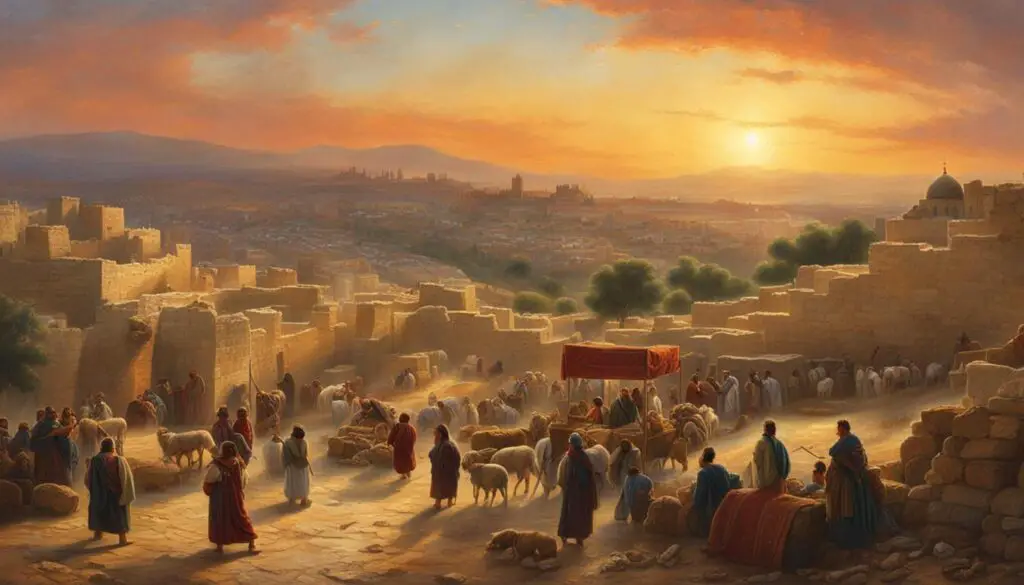
Major Biblical Events in Israel
Israel, the Holy Land, has been the backdrop for numerous major biblical events throughout history. These events hold immense significance and have shaped the course of its history. Let’s delve into some of the most notable biblical events that took place in this sacred land.
The Exodus of the Israelites from Egypt
One of the most well-known biblical events is the Exodus of the Israelites from Egypt. Led by Moses, the Israelites escaped slavery and journeyed through the desert towards the Promised Land. This event symbolizes liberation and the fulfillment of God’s promises to His people.
The Crossing of the Red Sea
Another iconic event that occurred in Israel is the miraculous crossing of the Red Sea. As the pursuing Egyptian army closed in on the Israelites, Moses, with the power of God, parted the Red Sea, allowing the Israelites to pass through on dry land. This event showcased divine intervention and protected the Israelites from their oppressors.
The Giving of the Ten Commandments at Mount Sinai
Mount Sinai, located in present-day Israel, is where Moses received the Ten Commandments from God. This pivotal event marked the establishment of the covenant between God and the Israelites, defining the moral code that would guide their lives and future generations.
The Journey of Jesus Christ
Israel is also deeply connected to the life and ministry of Jesus Christ. From his birth in Bethlehem to his teachings in Jerusalem and miracles performed throughout the region, the Holy Land is dotted with significant sites associated with Jesus’ life. Some notable locations include the Church of the Nativity, the Sea of Galilee, and the Via Dolorosa.
| Biblical Event | Location | Significance |
|---|---|---|
| The Exodus of the Israelites from Egypt | Desert of Sinai | Symbolizes liberation and fulfillment of God’s promises |
| The Crossing of the Red Sea | Red Sea | Showcases divine intervention and protection |
| The Giving of the Ten Commandments at Mount Sinai | Mount Sinai | Establishes the moral code for the Israelites |
| The Journey of Jesus Christ | Bethlehem, Jerusalem, Sea of Galilee, etc. | Significant sites associated with Jesus’ life and ministry |
These major biblical events have left an indelible mark on the history and religious significance of Israel. Exploring the sites where these events unfolded not only allows us to connect with our spiritual roots but also deepens our understanding of the profound impact they had on the people of Israel.
Beyond Ancient Roots: Modern Israel Unveiled

Modern Israel, with its deep historical and cultural ties, beckons visitors to explore its vibrant cities, experience its diverse traditions, and indulge in the natural wonders that abound. Two of its most iconic cities, Tel Aviv and Jerusalem, epitomize the fusion of old and new, tradition and innovation, making them must-visit destinations.
Tel Aviv, known as the “City that Never Sleeps,” boasts a thriving arts scene, a bustling nightlife, and a stunning Mediterranean coastline. Visitors can immerse themselves in Israeli culture through music, dance, and culinary delights in this modern metropolis.
Jerusalem, on the other hand, is steeped in biblical significance and offers a glimpse into the country’s rich history. From exploring the ancient narrow streets of the Old City to visiting iconic landmarks such as the Western Wall and the Church of the Holy Sepulchre, Jerusalem’s timeless allure captivates travelers from around the world.
Discovering the Dead Sea and Cultural Delights
No trip to Israel is complete without a visit to the Dead Sea, an extraordinary body of water that is famous for its high salt concentration and unique buoyancy. The sea’s mineral-rich mud is believed to have therapeutic properties, making it a popular destination for relaxation and rejuvenation.
“Israel is a country that seamlessly blends its ancient roots with a modern charm, offering visitors a unique cultural experience.”
Beyond its historical and natural wonders, Israel also offers a myriad of cultural experiences. From vibrant marketplaces like Mahane Yehuda in Jerusalem to the colorful streets of Jaffa, visitors can explore the local crafts, taste traditional cuisine, and engage with the welcoming locals.
Tourism and Beyond: Israel’s Allure
Israel’s rich heritage and captivating landscapes make it a highly sought-after destination for tourists from around the world. Its diverse attractions, ranging from archaeological sites to religious landmarks, offer a wealth of experiences for travelers seeking a deeper connection with history and spirituality.
The country’s commitment to sustainability is evident through its extensive national parks and nature reserves, providing abundant opportunities for outdoor enthusiasts to hike, bike, and explore its scenic beauty. Whether it’s witnessing the stunning sunset over the Negev Desert or marveling at the lush greenery of the Galilee region, Israel’s landscapes are sure to leave a lasting impression.
As modern Israel continues to evolve, it remains steadfast in preserving its heritage while embracing the present. This juxtaposition of ancient and contemporary elements creates a multifaceted destination that never fails to intrigue and inspire.
Exploring Israel’s Historical and Cultural Treasures
Israel is a treasure trove of historical and cultural wonders, offering visitors a deep dive into its rich heritage and vibrant traditions. From ancient archaeological sites to world-class museums and art galleries, there are countless opportunities to explore and learn more about the history and culture of this fascinating country.
The Western Wall, also known as the Wailing Wall, stands as a powerful symbol of Jewish faith and resilience. This sacred site in Jerusalem attracts visitors from all over the world who come to pray and connect with their spiritual roots. The Church of the Holy Sepulchre, located in the heart of Jerusalem’s Old City, is another must-visit landmark. It is believed to be the site of Jesus’ crucifixion, burial, and resurrection, making it a significant pilgrimage destination for Christians.
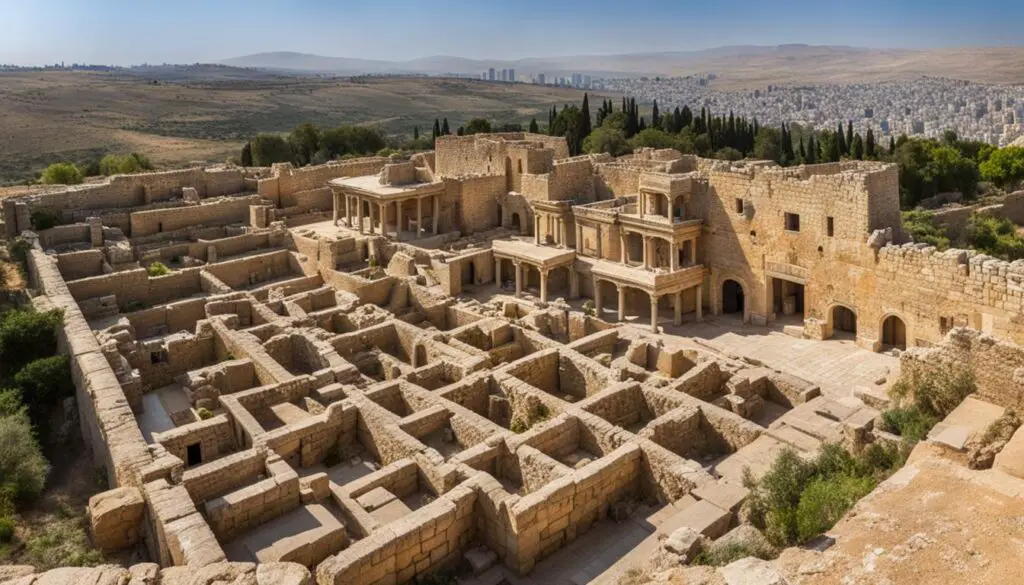
Israel’s diverse cuisine, music, and festivals also contribute to its vibrant cultural scene. The country’s culinary traditions blend flavors from the Middle East, North Africa, and the Mediterranean, resulting in a unique culinary experience. From the lively markets of Tel Aviv to the colorful street food stalls in Jerusalem, food lovers can indulge in a rich tapestry of flavors and aromas.
The cultural calendar of Israel is filled with festivals and events that showcase the country’s artistic and creative spirit. The Jerusalem International Film Festival, the Israel Festival in Jerusalem, and the Red Sea Jazz Festival in Eilat are just a few examples of the vibrant cultural events that take place throughout the year. These festivals attract artists and performers from around the world, offering a diverse range of music, dance, theater, and visual arts.
| Landmark | Description |
|---|---|
| Western Wall | The Western Wall is a significant Jewish holy site in Jerusalem. It is the last remaining part of the Second Temple and holds deep religious and historical importance. |
| Church of the Holy Sepulchre | Located in Jerusalem’s Old City, the Church of the Holy Sepulchre is one of the most important Christian pilgrimage sites. It is believed to be the place where Jesus was crucified, buried, and resurrected. |
| Masada | Perched atop a rugged plateau overlooking the Dead Sea, Masada is a UNESCO World Heritage Site. It is a symbol of Jewish courage and resistance against the Roman Empire. |
Jerusalem is a city that truly embodies the historical and cultural treasures of Israel. Its streets are steeped in thousands of years of history, and its diverse neighborhoods showcase the blending of different cultures and traditions. Whether you’re exploring the ancient alleys of the Old City, visiting the vibrant Mahane Yehuda Market, or enjoying a performance at the renowned Israel Museum, Jerusalem offers an immersive cultural experience like no other.
Israel’s historical and cultural treasures are an integral part of its identity and make it a fascinating destination for travelers seeking to delve into the past and experience its vibrant present. From iconic landmarks to mouthwatering cuisine and captivating festivals, there’s something for everyone to explore and enjoy in the Holy Land.
Unveiling the Natural Beauty of Israel
Israel’s natural beauty is a testament to its status as the Holy Land. From its diverse landscapes to its stunning coastlines, the country offers a visual feast for visitors. One of the most captivating natural wonders is the Dead Sea, with its buoyant waters and therapeutic mud. It’s a must-visit destination for those seeking relaxation and rejuvenation.

Another iconic landscape in Israel is the Negev Desert, with its vast stretches of sand dunes and rocky canyons. It’s a haven for adventure enthusiasts who can explore the desert on camelback, go hiking, or even try their hand at sandboarding. The breathtaking views and tranquil serenity make the Negev Desert a truly unforgettable experience.
Israel’s natural beauty extends to its diverse coastline along the Mediterranean Sea. From the rugged cliffs of Rosh Hanikra to the golden beaches of Tel Aviv, there is something for everyone to enjoy. Water sports enthusiasts can dive into the crystal-clear waters of Eilat’s coral reefs or surf the waves of the Mediterranean. The coastal landscapes provide a picturesque backdrop for relaxation and exploration.
Table: Natural Wonders of Israel
| Natural Wonder | Description |
|---|---|
| Dead Sea | A saltwater lake with high mineral content, known for its therapeutic properties and unique floating experience. |
| Negev Desert | A desert region characterized by vast sand dunes, canyons, and a diverse ecosystem. |
| Mediterranean Coastline | A scenic coastal stretch with rugged cliffs, golden beaches, and opportunities for water sports. |
| Sea of Galilee | A freshwater lake surrounded by beautiful landscapes, offering boating and fishing activities. |
Exploring Israel’s natural beauty allows visitors to connect with the land on a deeper level. From the ancient wonders of the Dead Sea to the majestic desert landscapes and picturesque coastlines, the Holy Land offers a myriad of experiences for nature lovers and adventure seekers alike. The natural wonders of Israel serve as a reminder of the country’s rich heritage and its enduring allure as a destination.
Planning Your Journey to Israel
Planning a journey to Israel requires careful consideration to ensure a smooth and memorable experience in the Holy Land. To begin, it is important to determine the best time to visit, taking into account weather conditions and cultural events. Israel experiences a Mediterranean climate, with hot summers and cool winters. Spring and autumn are generally considered the most pleasant seasons, offering moderate temperatures and beautiful landscapes. It is also worth noting that certain festivals and holidays, such as Passover and Hanukkah, may impact travel arrangements and hotel availability.
Once you have chosen your travel dates, it is advisable to research and select tour packages or create a personalized itinerary based on your interests. Whether you are interested in exploring historical sites, embarking on culinary tours, or enjoying outdoor adventures, Israel offers a wide range of options to cater to various preferences. Consider visiting iconic destinations such as Tel Aviv, Jerusalem, the Dead Sea, and the Sea of Galilee, each offering unique cultural and natural experiences.
When planning your journey, it is essential to ensure you have all the necessary travel documents. Make sure your passport is valid for at least six months beyond your intended departure date and check if you require a visa. It is recommended to obtain comprehensive travel insurance to cover any unforeseen circumstances during your trip. Familiarize yourself with the local customs and regulations to ensure you have a respectful and enjoyable experience. Your travel agent or embassy can provide you with the most up-to-date information and guidance.
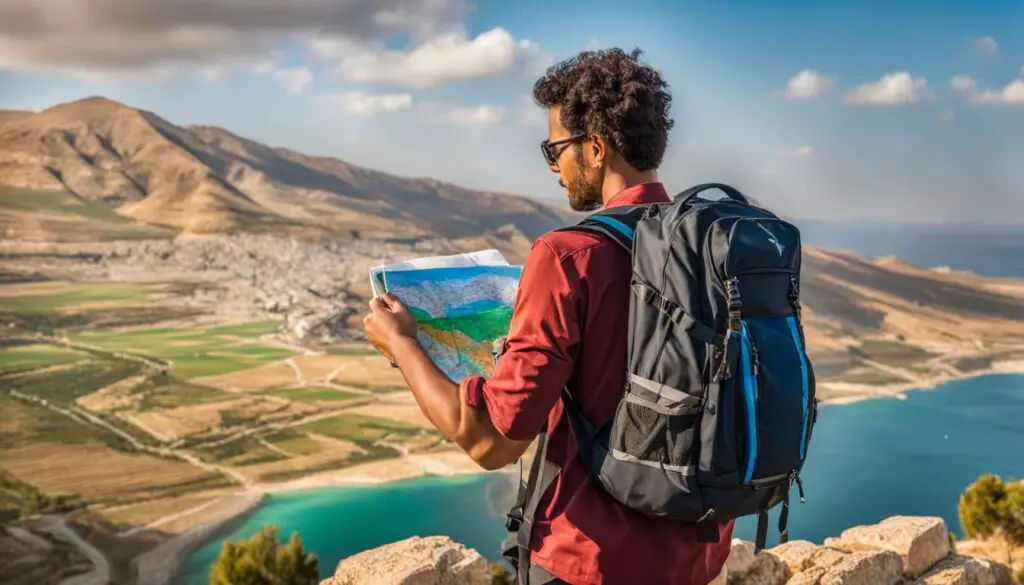
Key Considerations for Planning Your Journey:
- Research the best time to visit based on weather conditions and cultural events
- Select tour packages or create a personalized itinerary based on your interests
- Ensure your passport is valid and check if you require a visa
- Obtain comprehensive travel insurance
- Familiarize yourself with local customs and regulations
By considering these important aspects and planning ahead, you can make the most of your journey to Israel. Remember to stay open-minded, embrace the cultural diversity, and immerse yourself in the rich history and natural beauty of the Holy Land.
Conclusion
Exploring Israel allows visitors to embark on a journey of spiritual and historical significance in the Holy Land. This ancient land holds immense biblical importance, being the birthplace of Judaism, Christianity, and Islam. It is a place where notable biblical figures such as Abraham, Moses, David, and Jesus walked, leaving their mark on history.
In biblical times, Israel was a land divided into kingdoms, where cities like Jerusalem and Jericho played pivotal roles in biblical narratives. It was a land defined by its agricultural practices and witnessed major biblical events like the Exodus, the giving of the Ten Commandments, and the journey of Jesus Christ.
Today, modern Israel seamlessly blends its ancient heritage with contemporary elements. Cities like Tel Aviv and Jerusalem offer vibrant cultural experiences, while the Dead Sea provides a unique opportunity for relaxation. The country’s historical and cultural treasures, from archaeological sites to museums, enrich the understanding of its rich heritage. Nature lovers can explore breathtaking landscapes, from the cliffs of the Mediterranean coast to the serenity of the Sea of Galilee.
By planning a journey to the Holy Land, travelers can immerse themselves in Israel’s heritage, witness its captivating landscapes, and gain a deeper understanding of the biblical narratives that have shaped its history. Israel truly unravels the beauty and significance of the Holy Land, making it a must-visit destination for those seeking spiritual enrichment and cultural exploration.
FAQ
What is the biblical importance of Israel?
Israel holds immense biblical importance as it is mentioned extensively in the Bible. It is referred to as the Holy Land and is associated with numerous biblical figures and events. It is the birthplace of Judaism, Christianity, and Islam.
Which notable biblical figures are linked to Israel?
Israel is closely connected to many notable biblical figures. Some examples include Abraham, Moses, David, Solomon, Elijah, John the Baptist, and Jesus.
What was Israel like in biblical times?
In biblical times, Israel was a land of great significance. It was divided into various kingdoms, characterized by agricultural practices. Cities like Jerusalem and Jericho played prominent roles in biblical narratives.
What are some major biblical events that took place in Israel?
Israel is the setting for numerous major biblical events, including the Exodus, the crossing of the Red Sea, the giving of the Ten Commandments, and the journey of Jesus Christ.
What is modern Israel like?
Modern Israel is a vibrant and diverse country. Cities like Tel Aviv and Jerusalem blend historical and modern elements, offering a unique cultural experience. The Dead Sea provides opportunities for relaxation, and archaeological sites offer glimpses into the past.
What historical and cultural treasures can be found in Israel?
Israel is home to a wealth of historical and cultural treasures, including ancient archaeological sites, landmarks like the Western Wall and the Church of the Holy Sepulchre, and a vibrant cultural scene with diverse cuisine, music, and festivals.
What natural beauty can be found in Israel?
Israel’s natural beauty is as captivating as its historical and cultural treasures. From the stunning cliffs of the Mediterranean coastline to the serene waters of the Sea of Galilee and the breathtaking landscapes of the Negev Desert, Israel offers a diverse range of natural wonders.
How should I plan my journey to Israel?
Planning your journey to Israel requires careful consideration of the best time to visit, researching and selecting tour packages or creating a personalized itinerary, ensuring you have all necessary travel documents, and being aware of local customs and regulations.
What can I expect to experience in Israel?
Exploring Israel allows visitors to uncover the beauty and history of the Holy Land, witness its captivating landscapes, and immerse themselves in its heritage, creating lasting memories.


